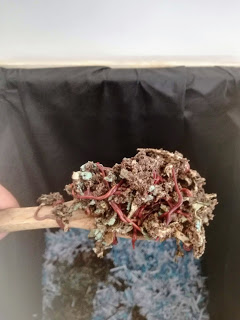The Box of Life: Vermicomposting as a Way to Take Control of Your Food Waste
Ever wondered how to turn your food waste away from landfills and into healthy soil for your houseplants and/or garden? Look no further. This week, Good Choice Initiative met with Akil, Founder of The Box of Life, who explains the benefits of using vermicomposting in your home.
What is vermicomposting and who is The Box of Life?
We’ve all been there…a smelly or leaky garbage bin, that sometimes attracts flies, that your cat often knocks over, and that you have to take out to the kerb at -20 C in the winter, when you’d rather be doing anything else. This is how Akil, Founder of The Box of Life, felt a few years ago when he first started composting at home. He then decided to design a system for homes and businesses to help them transition towards zero waste while building healthy soil from their food waste.

Akil admits that the reason he started composting was because he felt guilty that he couldn’t compost, since where he was living in the U.S. didn’t have a municipal program in which he could participate. He was also in a job that didn’t align with his values, so he felt the desire to contribute to making a difference on a personal level. The Box of Life is a social enterprise that aims to end food waste going to landfills by empowering people to compost their own waste in the comfort of their own home.

At the beginning, Akil was only aware of the traditional ‘hot’
composting, which uses high levels of heat to break down food waste but that wasn’t feasible for his small apartment.
After some research, he discovered vermicomposting as another method which uses earthworms and microorganisms to break down the waste and could be done indoors and with a small amount of floor space.
Akil got his first batch of earthworms, red wrigglers, from someone on Craigslist and they have been reproducing ever since.

What do I need to know about maintaining a vermicompost bin?
The City of Ottawa’s green bin program picks up household organic waste and breaks it down using high temperatures to turn it into fertile soil over a period of 3 months. Vermicomposting only requires being at room temperature for the microorganisms to break down food and for worms to finish it off after only 30 days. It can be done indoors as it does not require much space and requires neutral alkalinity (acidity). It’s important to note that to ensure ideal balanced conditions for the worms, there must be equal amounts of bedding (shredded paper, cardboard, dried leaves…) added to the food scraps.
Since many buildings in Ottawa do not provide the green bin service, residents have the option of using their own vermicompost bin to create fertile soil, which can then be used for their house plants or as a gift to friends with a garden. Boxes are esthetically pleasing and decorative, and can be used for additional purposes such as a side table.

What goes in the vermicompost bin?
Everything that is natural, i.e. fruits, vegetables, fabrics etc. Cooked foods can also be included. Meat and dairy should not be placed in the bin as it could smell and would take longer to decompose. Citrus should be added sparingly as it could affect the acidity of the bin. Any excess food waste can be frozen for use in the future.
Where can I buy a worm bin from The Box Of Life and how can I get support/ask questions about my bin?
You can place an order online via their Facebook or Instagram pages, or you can attend a workshop to build your own, which would take approximately 6 hours. The Box of Life has an online community through their Facebook group where bin owners can connect and communicate with each other while getting the answers they need.

What upcoming events or projects can I look out for?
The Box of Life plans to offer 2 workshops per month at their Makerspace North location and is considering offering workshops in 2 parts of 3 hours each during the week, instead of only on weekends which they are currently doing.
They will be at the Big Love Freewheeling Craft Market on February 16th at the Glebe Community Centre and their next Build a Worm Bin Workshop will be on February 23rd.
The Box of Life has recently partnered with Rideau-Rockliffe Community Resource Centre’s incubator13 to harvest the leftover soil and roots from microgreens in their Social Harvest Ottawa program to create healthy soil from their waste and to develop a closed loop system. In the future, The Box of Life hopes to implement community compost initiatives in neighbourhoods that are interested in participating. This would allow people to connect with each other and share resources so that everyone can benefit from healthy and fertile soil. The Box of Life hopes to make the resulting casting (a.k.a worm poo) available at a low cost to anyone who would benefit from the nutrient-rich soil.
For more information on Box of Life and to connect with them, join their Facebook page or their Instagram @the.box.of.life


